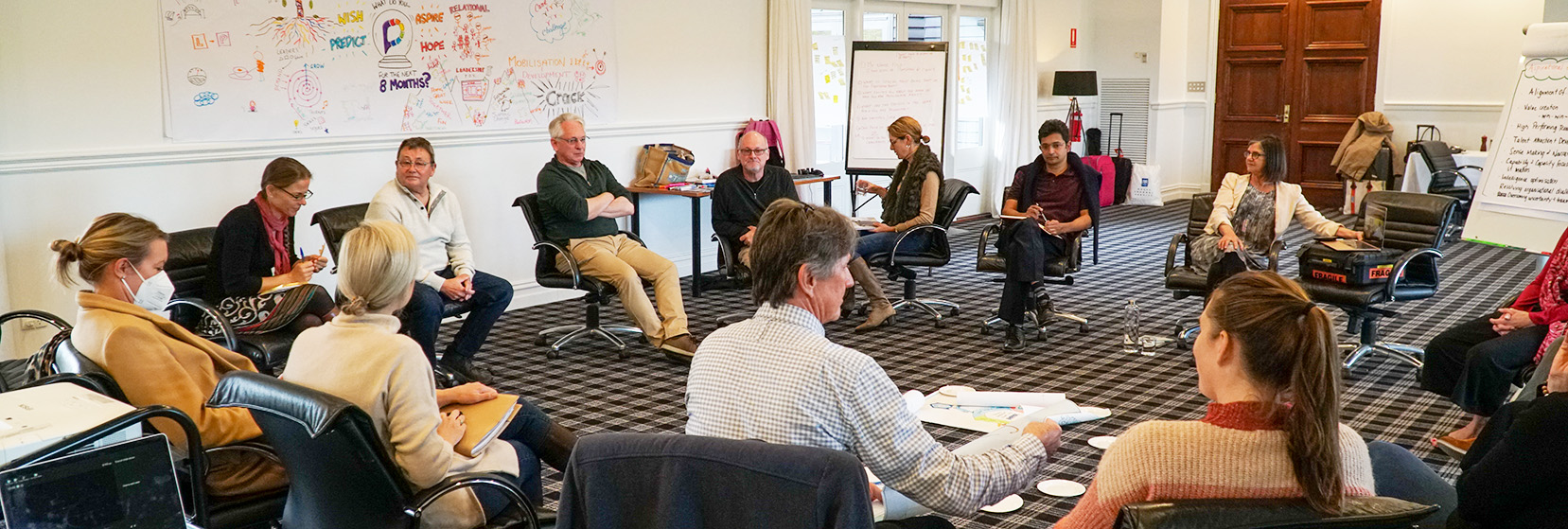
07 Jul Power and trust in a VUCA world: From vertical to horizontal leadership
I was thrilled to speak at the last Berlin Change Days Conference, where Vesa Purokuru and I reflected on changing paradigms of leadership and the importance of a coaching culture to master the challenges of a world full of ambiguity and uncertainty.
The future of work is changing, giving new meaning to the concept of ‘leadership’. Network models of working are emerging to replace traditional hierarchical structures and managers are no longer leading their troops from the front. In the future, leadership will be distributed so that organisations will be more self-directed and workers at all levels more comfortable co-leading with others. The vertical “power over” is changing to horizontal “power with”. Leadership is becoming a skill that every employee needs to be able to collaborate, deliver, renew and navigate agilely through constantly changing and challenging the VUCA environment.
Meeting for the first time at the 2017 Berlin Change Days (BCD) conference travelling from polar opposite ends of the world, we were struck by the strong resonance in our shared experiences and reflections. As witnesses to organisations preparing to lead in a volatile, uncertain, complex and ambiguous (VUCA) world, we have worked with more than 5,000 leaders throughout the public, private and not for profit sectors in Australia, South East Asia and Finland.
What is emerging?
The VUCA world is brimming with uncertainty about the future, volatility of global market forces, complexity of juggling multiple and competing demands and a blurring of lines between our work and personal lives. To be successful in this context calls on the capacity to constantly develop new innovative ways of thinking and doing.
Finding meaning, purpose and passion in our work is taking precedence over the search for power and control. As the focus shifts from financial incentives to learning and development, real collaboration among trusted peers becomes a pre-condition for success.
In reality, culture change is advancing slowly and old power structures are still in full force: While leaders know and value the idea of ‘coaching conversations’, they default to a ‘telling’ style. They don’t trust experts to solve problems and make sound decisions on their own. Instead, leaders use their power to control and micromanage the work of their employees. When these assumptions play out in the workplace, many managers treat workers as children who need guidance and instruction.
These tensions put the practice of organisational leadership into a new perspective, highlighting the need to transform old beliefs into new ways of being. Some of the key shifts needed are from:
- directing individuals to do the work to nurturing collaborative relationships among peers to devise innovative, strategic solutions
- external rewards and threats to intrinsic motivation, meaning and purpose to meet higher level needs of belonging, learning, co-creation and accomplishment
- vertical, top-down leadership to horizontal, peer-driven coaching and support to develop agile and resilient workplace cultures
- obeying rules and procedures to exploring and meeting clients’ expectations to create real value and sustainable impact
- power over, using force from above to collaborative, dialogic conversations to accept multiple truths to manage conflicting interests
Leadership in a VUCA world requires new ways of thinking, built on a new kind of power and trust. We need to view our employees as responsible adults who are motivated and committed to create purpose, set aims and learn from their experiences. The old saying: “Trust is good but control is better” must be challenged.
Critically, coaching is no longer a tool only for leaders. Organisations need to build the coaching capabilities of all employees. This will enable all workers to engage in deep, meaningful dialogue with each other, clients and team members, turning knowing into doing and being.
Contemporary research is increasingly indicating that a strong coaching culture is positively correlated with employee engagement and financial performance. For example, a 2016 study released by the International Coaching Federation and Human Capital Institute revealed that nearly two thirds of organisations reporting strong coaching cultures rated their employees as ‘highly engaged’ compared to only half those firms that do not have strong coaching cultures. Similarly, 51% of organisations with cultures that integrate coaching into their workplace behaviours report their 2015 revenue to be above that of their industry peer group, compared to 38% from all other organisations.
How do organisations create new trust-based cultures?
A new kind of mindset and working culture develops slowly, yet strongly, if genuinely desired. Self-directedness requires a clear picture of the direction in which the organisation is going. Decision-making by autonomous teams need space and wide frames to ask important questions: What is our power and responsibility? What are we able to decide and do in our own way? Autonomy depends on constructive feedback loops provided through measurement and facilitated reflective discussions that give understanding of direction and the capacity to auto-correct. All of this gives a new kind of power to individuals, teams and peers.
Peers can support each other through questioning, collaborative enquiry and reflective practice. They can learn to observe, model, practise and share feedback on the very mindsets, tactics and skill sets required to manage themselves and engage clients, teams and other key stakeholders. Through fostering strong bonds, coaching behaviours become increasingly modeled and embedded in everyday work life.
Coaching among peers enables collective support in which collaborators can reflect more deeply than they would on their own. Peer coaching creates a safe opportunity for sponsors (mentors) of the organisation’s future talent to review their current practices and design and implement sustainable improvements together.
Case in point: City council
Department of 150 employees
Purpose: Develop their culture towards a more self-directive model. Development project is executed in three phases:
Phase 1: Common vision co-created to discuss and define the aims of the project, recognise strengths and improvements gained, imagine desired culture.
Phase 2: Designed basic frames for self-directiveness. Include City’s laws, strategies, resources, changing client needs / new trends, and most significantly, beliefs and dialogic capabilities.
Phase 3: Experiment, test and learn how and what employees can decide on their own instead of asking managers.
Phase 4: Build collaboration mindsets and skills through learning and embedding peer coaching throughout the organization.
So, where to start to cultivate a new kind of power?
None of this is of any use unless you go out and try it:
- Consider how to build skills within the organisation to build capability and independence.
- Start small: give a group of peers a manageable experience of collaborating to make decisions and you’ll find they will want more.
- Remember that if you do take on the role as a facilitator of ‘peer coaching’, your responsibility is in helping peers to coach each other. Be aware of not falling into the role where you are taking over and ‘doing’ the work of coaching yourselves.
- Engage in your own experience of being coached – maintain your own space for reflective practice.
- Finally, engage in your own process of coaching and deep dialogue with your own peers to harness and model the potential for the power of trust to lead in your VUCA world.
Leading successfully in the VUCA world requires the fundamental capacity to cultivate a work environment in which all members of an organisation, unrestricted by role or reporting relationships, courageously engage in candid and respectful conversations with one another. This is about building confidence, trust and competence, to foster diversity of thinking, promote a culture of inclusion and facilitate a genuine belief and backbone in becoming, as Robert Kegan describes: ‘deliberately developmental’.
“What if a company did everything in its power to create a culture in which everyone – not just select ‘high potentials’ – could overcome their internal barriers to change and use errors and vulnerabilities as prime opportunities for personal and company growth?….in which support of people’s development is woven into the daily fabric of the company’s regular routines, operations and conversations.”
An Everyone Culture: Becoming a Deliberately Developmental Organization, by Robert Kegan, Lisa Laskow, Matthew L Miller and Andy Fleming.
This article was first published in the Power and Trust Berlin Changes Days eBook
Written by Kerryn Miller
Director,
PiqueGlobal

